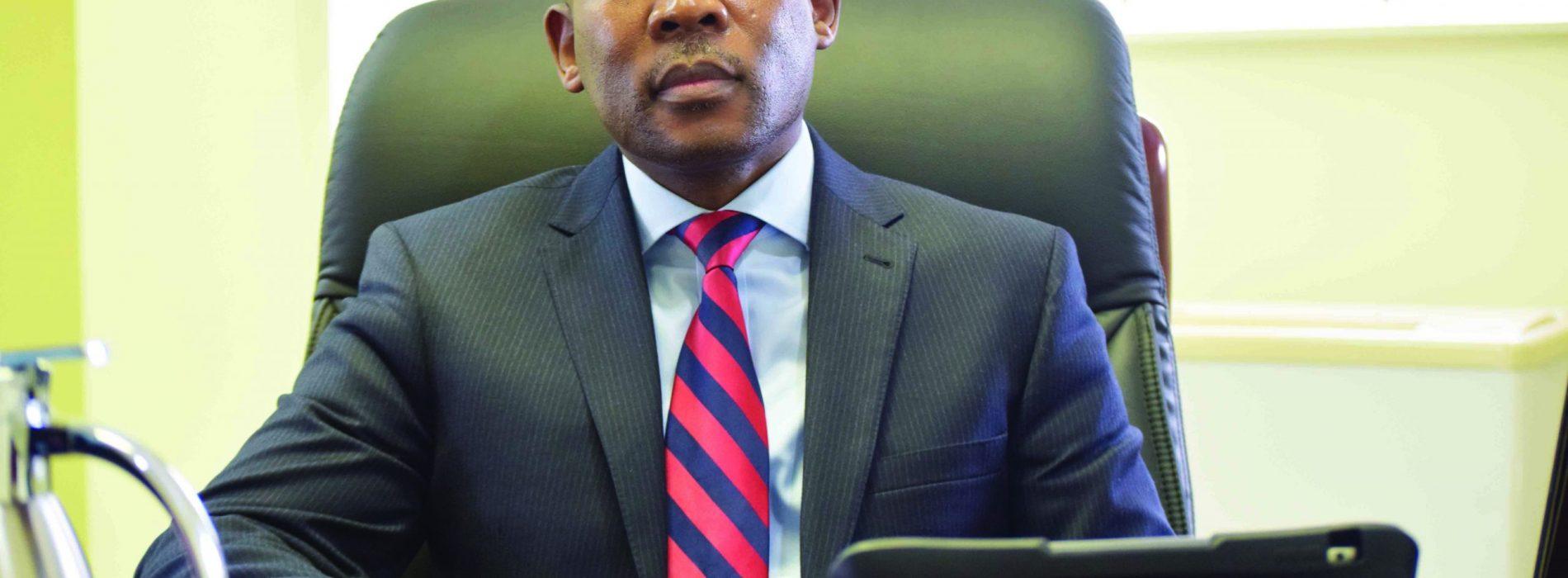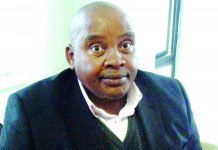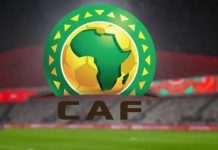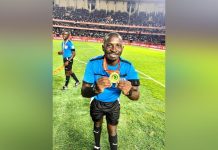Africa-Press – Lesotho. GROWING up in a home of people who strived for peace, freedom and democracy, Advocate Mafiroane Motanyane knew he had only one path to take: the legal profession.
“I wanted to stand for the oppressed and fight for them by representing them when their rights are infringed,” said Advocate Motanyane, currently the Chief Executive Officer (CEO) of the National Reforms Authority (NRA).
Raised in Leribe, Ha-Lejone, Advocate Motanyane credits his grandmother who raised him for instilling in him a sense of responsibility and empathy before he relocated to his parents’ home when he was in Standard Three.
He said his grandmother raised him like a normal Mosotho child, herding cattle after school, attending to family chores and even going to the fields to plant and harvest crops.
“I grew up in that humble home just like any Mosotho child,” he said, attributing his strong Christian values to his grandmother. His parents reinforced the principles, which were anchored in religion and respect for fellow human beings.
“I grew up in a home of parents who despised oppression, fought for democracy and emancipation of the Basotho nation,” he told thepost.
“My father even paid the price for it.
He studied law at the National University of Lesotho (NUL), before doing a post-graduate diploma in law which was jointly offered by NUL, the University of Cape Town and the University of Namibia.
He said he chose law because he liked it when he was doing his Form E. As a young boy, he was more interested in commercial subjects such as Commerce and Accounts but shifted his attitude towards law as he became more aware of human rights issues.
It was also at a time when Lesotho was drifting towards a democratic path. “It was an exciting time. I thought the legal background would better enable me to participate meaningfully in the democratic space.
I thought in a democracy where there is freedom, society would need adequate lawyers to defend the rights of people should the need arise,” he said. “I am content with the choice I made.
”
He said he applied for the CEO position at the NRA because he believed the position would give him an opportunity to advance Lesotho’s democratic agenda.
“We need to participate in the running of the affairs of our country. Both young and old people need to participate in the shaping of the future of the Lesotho we need,” he said.
“I thought this is the time for me to take a step and participate directly in the shaping of the future of Lesotho as opposed to standing idly and watching people trying to shape Lesotho without directly helping in one way or the other.
He said following his appointment as the NRA CEO in October 2020, the biggest challenges included starting up from scratch: from setting up the office and doing the budgets as there was no legal instrument to guide him on staff recruitment.
“We started everything from scratch without support staff. It was a mammoth task,” he said, adding that he had to formulate a legal framework that enabled him to proceed with the appointment of staff.
Finding the right candidates to fill the vacancies was the next big challenge as his mandate was to complete the tasks of the NRA within a time frame of 12 to 18 months.
“For us to accomplish the amount of work within that short time frame we needed to have the right human resources in place. It was a very difficult task. ”
One of the NRA’s successes has been the establishment of a secretariat and the recruitment of experts with extensive knowledge of human rights issues.
Advocate Motanyane said Lesotho faces a number of challenges. He pointed out political instability and security challenges as the most pressing, as identified in the reforms roadmap.
“These challenges have led to a weak state and governance institutions hence the birth of the NRA,” he said.
“The Lesotho that we want is a prosperous and stable country, a country marked by effective and people-focused institutions,” he said.
“We need a Lesotho with a national unity of purpose in which there is rule of law, good governance and human rights.
And for us to achieve this, we have to put our efforts together towards ensuring that the reforms programme becomes a success. ”
He said the reforms are centered on seven sectors.
These are constitutional, parliamentary, justice, security, public, media and economic reforms. “If we can get it right in all these sectors, I am sure that we will be able to transform Lesotho.
But over and above that, we also have to transform the very public institutions that deliver services to Basotho. ”
In addition, he says the NRA needs to also work on sustainable peace, national unity and reconciliation.
“If we get this right, we can achieve the Lesotho we want. It doesn’t take the NRA only to transform Lesotho but the public at large.
”
He said the National Peace and Unity Bill is an instrument produced by the government to address some of the challenges facing Lesotho.
He said Basotho indicated that the NRA should work on transitional justice mechanisms that address human rights violations, politically motivated crimes and reconciliation.
“They indicated that such work should be done with a view to balance justice and impunity. Human rights violations of the past have to be addressed but in a way that there is balance, we have to do that without promoting impunity,” he said.
“We ought to have open discussions for Basotho to clarify what they mean by human rights violations of the past for them to agree on the scope to be considered and who the victims are.
”
He said the NRA plans to hold a stakeholders forum where participants will be free to air their views.
He said the NRA has developed some legal instruments for several Bills that will be forwarded to parliament “soon” for consideration. These include the Referendum Bill, the Human Rights Commission Bill and the Media Policy.
“We want to ensure that when we go for elections next year, our constitution will answer many of the post-election challenges experienced in the past,” he said.
“With the reforms, we are hoping to work on our institutions to make them effective and to be run by competent people.
Once we achieve that, we will be able to a greater extent to implement all that needs to be done,” he said. He urged stakeholders to fully participate in the reforms process to ensure that as many voices as possible are heard.
“These reforms are not for the NRA but for the nation so it is vital for citizens to have ownership from the start so as to ease the implementation processes.
However, he said the NRA has been unable to ensure broad participation due to lack of finances and the short time frame allocated for the authority’s huge workload.
“We simply don’t have enough time…not much has been done as we do it through radio programmes but it is not done fairly well in that space.
”
He says the reforms are an ongoing process that needs time and it can go on for a number of years depending on the country’s democratic ambitions.
“It is my sincere belief that the reforms will not be seen to be synonymous with the NRA. I encourage the continuation of this process even beyond the NRA,” he said.
“We are not oblivious to the fact that the economy is struggling, as such we can’t have all the money hence the need to rationalise it. It may not be enough for everything but is enough for substantial work to be done. Reforms are an expensive exercise.”
For More News And Analysis About Lesotho Follow Africa-Press






